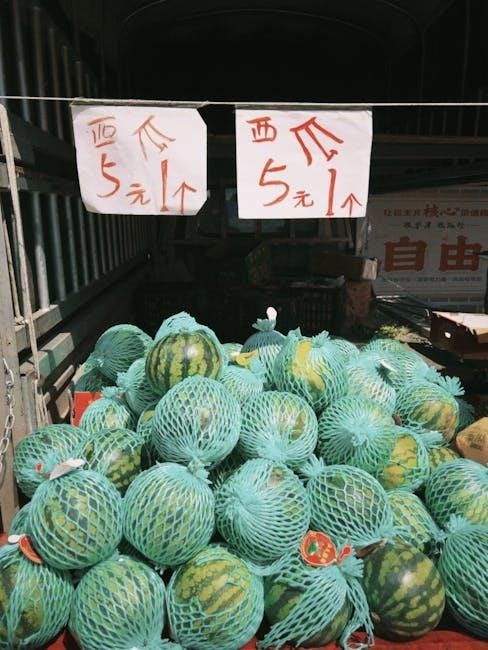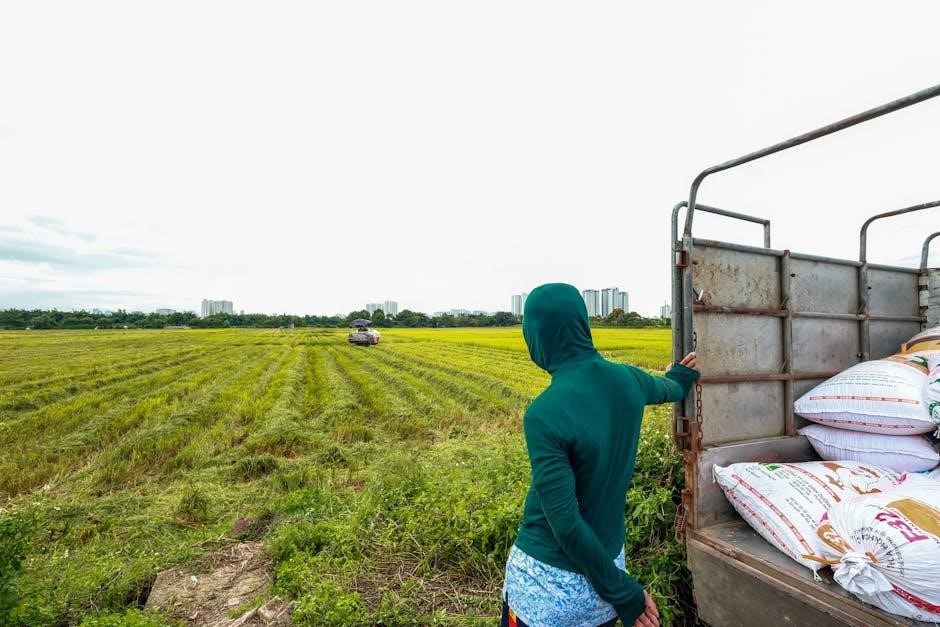The story of the Chinese farmer is a timeless Taoist parable about perspective and fortune. It originates from ancient Chinese folklore, emphasizing themes of uncertainty and balance in life. The tale has become a universal lesson on hidden blessings and non-judgmental thinking, resonating across cultures and generations.
1.1. Overview of the Story
The story of the Chinese farmer revolves around a Taoist parable that explores themes of fortune, misfortune, and the unpredictability of life. A farmer’s horse runs away, leading neighbors to express sympathy, but the farmer remains indifferent, recognizing that events unfold unpredictably. Later, the horse returns with more horses, bringing unexpected fortune. This cycle of loss and gain teaches the importance of maintaining balance and avoiding hasty judgments about life’s events. The narrative emphasizes the Taoist philosophy of accepting uncertainty and finding harmony in life’s duality.
1.2. Historical Context
The story of the Chinese farmer is rooted in ancient Chinese folklore, reflecting Taoist philosophy and the cultural values of the time. Originating from oral traditions, it has been passed down through generations, becoming a cornerstone of East Asian cultural heritage. The narrative embodies the wisdom of accepting life’s unpredictability, a concept deeply ingrained in Taoist teachings. Historically, such stories were used to convey moral and philosophical lessons, making them integral to the region’s intellectual and spiritual landscape. The tale’s enduring relevance highlights its universal appeal and timeless wisdom.
1.3. Cultural Significance
The story of the Chinese farmer holds profound cultural significance, embodying Taoist principles and Eastern philosophy. It teaches acceptance of uncertainty and non-judgmental thinking, reflecting the wisdom of ancient Chinese thought. The tale transcends cultural boundaries, offering universal life lessons that resonate globally. Its themes of hidden blessings and balance in life have made it a cherished parable across generations. The farmer’s story is celebrated for its ability to inspire personal growth and resilience, cementing its place in the collective cultural consciousness of East Asia and beyond.
Origins of the Story
The story of the Chinese farmer originates from ancient Chinese folklore, rooted in oral tradition and influenced by Taoist philosophy, reflecting East Asian cultural and philosophical heritage.
2.1. Folklore and Oral Tradition
The story of the Chinese farmer is deeply rooted in ancient oral tradition, passed down through generations as a timeless Taoist parable. Originating from Chinese folklore, it reflects themes of uncertainty and balance, emphasizing the cyclical nature of life. The tale has been shared verbally, evolving naturally over time, and remains a cherished part of East Asian cultural heritage. Its enduring appeal lies in its simplicity and universal lessons, making it a popular narrative for both entertainment and moral instruction; The story’s oral origins highlight its role in preserving cultural values and philosophical insights.
2.2; Influence of Taoist Philosophy
The story of the Chinese farmer is deeply influenced by Taoist philosophy, particularly the concept of wu wei (non-action) and the balance of opposites. Taoism emphasizes harmony with nature and the cyclical nature of life, themes central to the story. The farmer’s neutral response to events reflects the Taoist idea of non-judgment, illustrating that what seems bad can lead to good and vice versa. This philosophical underpinning makes the story a powerful allegory for understanding the balance and interconnectedness of life, aligning with Taoist teachings on accepting uncertainty and living in harmony with the natural order.
2.3. Connection to East Asian Culture
The story of the Chinese farmer resonates deeply within East Asian culture, reflecting shared values and philosophies. Originating in China, it has influenced neighboring countries like Korea and Japan, where similar moral tales are common. The narrative aligns with the region’s emphasis on community, resilience, and the cyclical nature of life. Its themes of hidden blessings and non-judgment are central to East Asian thought, often used to teach patience and acceptance. The story’s adaptability across cultures highlights its universal relevance, making it a cherished moral lesson throughout East Asia. Its enduring popularity underscores its cultural significance.

Key Events in the Story
The horse escapes, neighbors offer sympathy, and the farmer remains indifferent. These events unfold to illustrate life’s unpredictable nature and the importance of maintaining balance and perspective.
3.1. The Horse Runs Away
The story begins with the farmer’s prized horse escaping into the hills. This event sets off a chain of unpredictable occurrences, highlighting life’s inherent unpredictability. The horse’s departure leaves the farmer and his son without their primary means of labor, creating an initial sense of loss. However, this event is merely the first in a series of twists that challenge the farmer’s perspective and demonstrate the Taoist principle of accepting change without judgment. The escape of the horse symbolizes the uncontrollable nature of life, setting the stage for the farmer’s philosophically grounded response.
3.2. Neighbors’ Reaction
Upon hearing of the horse’s escape, the farmer’s neighbors rushed to express their sympathy. They viewed the event as a clear misfortune, offering condolences for the farmer’s apparent loss. The neighbors’ reaction reflects a common human tendency to judge events as good or bad based on immediate circumstances. Their sympathetic response contrasts with the farmer’s calm and non-judgmental outlook, highlighting the story’s central theme of perspective and the limitations of immediate judgment. The neighbors’ reaction sets the stage for the farmer’s philosophically grounded response, which challenges their assumptions about fortune and misfortune.
3.3. The Farmer’s Response
The farmer, however, remained calm and non-judgmental. He acknowledged the situation without labeling it as good or bad, saying, “We’ll see.” His response reflected a deep understanding of life’s uncertainty and the interconnected nature of events. Unlike his neighbors, who immediately sympathized, the farmer chose not to attach a fixed meaning to the horse’s escape. His calm demeanor and open-mindedness exemplify the Taoist principle of accepting life’s unpredictability, highlighting the importance of patience and perspective in the face of change. This reaction sets the stage for the story’s unfolding lessons on hidden blessings and balance.
Themes and Lessons
The story explores themes of hidden blessings, duality of events, and detachment. It teaches universal lessons about perspective, uncertainty, and the interconnectedness of life’s experiences.
4.1. Hidden Blessings in Disguise
The story of the Chinese farmer illustrates how life’s challenges often conceal unseen benefits. When the farmer’s horse runs away, it initially seems like a misfortune, but subsequent events reveal unexpected positive outcomes. This theme encourages a mindset of optimism and patience, reminding us that what appears negative may ultimately lead to growth or advantage. By embracing uncertainty, we can uncover hidden opportunities that life presents.
4.2. The Concept of Duality (Good vs. Bad)
The story of the Chinese farmer explores the concept of duality, challenging the notion of fixed distinctions between good and bad events. When the horse runs away, the neighbors perceive it as a misfortune, yet it later leads to unexpected benefits. This teaches us to avoid rigid judgments, as life’s events are interconnected and often fluid. The farmer’s non-judgmental outlook reflects Taoist wisdom, emphasizing that what seems bad may become good, and vice versa, highlighting the balance and interdependence of opposites in life.
4.3. Importance of Detachment
The story underscores the importance of detachment, a key Taoist principle. The farmer’s calm demeanor, despite losing his horse, illustrates a lack of attachment to external events. His composure reflects an understanding that true peace comes from within, not from material possessions or fleeting circumstances; This detachment allows him to remain balanced and resilient, embracing life’s uncertainties without being controlled by them. The story teaches us to let go of emotional investments in outcomes, fostering a mindset of acceptance and harmony with life’s natural flow, which is essential for emotional well-being and inner peace.

The Farmer’s Philosophy
The farmer embodies acceptance of life’s uncertainties, embracing events without judgment. His philosophy centers on harmony with nature, reflecting Taoist principles of balance and non-resistance.
5.1. Acceptance of Uncertainty
The farmer’s philosophy revolves around accepting life’s unpredictability. He understands that events unfold beyond his control, teaching him to embrace uncertainty without resistance. This mindset allows him to remain calm amidst change, avoiding the turmoil of constant questioning. By accepting the unpredictable nature of life, he finds peace in the present moment. This acceptance is a cornerstone of his wisdom, reflecting the Taoist idea of aligning with the natural flow of events rather than struggling against them. His story illustrates how embracing uncertainty can lead to inner harmony and balance.
5.2. Non-Judgmental Outlook
The farmer’s non-judgmental outlook is central to his philosophy. He avoids labeling events as good or bad, instead embracing them as they are. When his horse runs away, he remains neutral, saying, “Maybe it’s a blessing, maybe it’s a disaster.” This mindset prevents him from being swayed by immediate emotions, allowing him to see the bigger picture. His neighbors, in contrast, quickly judge the situation, highlighting the difference between reactive thinking and mindful acceptance. The story teaches that judgment often clouds perception, while a non-judgmental outlook fosters clarity and peace, even in uncertain times.
5.3. Harmony with Nature
The farmer’s philosophy emphasizes living in harmony with nature, reflecting Taoist ideals of aligning with the natural order. He avoids resisting life’s twists, viewing events like the horse’s escape as part of the natural flow. This harmony allows him to maintain balance and peace, free from unnecessary struggle. By embracing nature’s rhythms, he exemplifies a life attuned to the universe, illustrating the importance of acceptance and balance in achieving inner stability and contentment.
Cultural and Philosophical Interpretations
The story reflects Taoist principles of balance and non-judgment, while also resonating with Buddhist ideas of detachment. Its universal themes transcend cultures, offering wisdom on life’s uncertainties and duality.
6.1. Taoist Teachings
The story aligns with Taoist philosophy, emphasizing balance and non-judgment. It reflects the principle of wu-wei (non-action) and the idea that events are neither inherently good nor bad. The farmer’s calm acceptance of the horse’s departure and its eventual return illustrates the Taoist concept of the fluid nature of fortune and misfortune. This teaching encourages individuals to embrace life’s uncertainties without attachment, aligning with the natural order of the universe. The narrative embodies Taoist wisdom, offering insights into harmony, perspective, and the cyclical nature of existence.

6.2. Buddhist Influences
The story also resonates with Buddhist principles, particularly the concept of detachment and acceptance of life’s impermanence. The farmer’s neutral response to the horse’s departure reflects the Buddhist teaching of non-attachment to outcomes. This aligns with the idea that suffering arises from desire and clinging. The narrative subtly illustrates the Buddhist philosophy of equanimity, where one remains calm amidst life’s unpredictability. By not labeling events as good or bad, the farmer embodies the Buddhist ideal of mindfulness and acceptance, offering a universal lesson in emotional resilience and inner peace.
6.3. Universal Life Lessons
The story of the Chinese farmer offers universal life lessons about perspective, resilience, and the unpredictability of life. It teaches us to avoid hasty judgments and embrace uncertainty, as events can unfold in unexpected ways. The narrative emphasizes the importance of adaptability and the value of remaining neutral in the face of change. These lessons transcend cultural boundaries, making the story a timeless guide for personal growth and decision-making. Its wisdom encourages us to find balance and harmony, regardless of life’s challenges, fostering a deeper understanding of life’s inherent duality and interconnectedness.

Modern Applications of the Story
The story’s timeless wisdom is applied in modern contexts, inspiring personal growth, leadership strategies, and mental well-being by fostering resilience and adaptable thinking in today’s fast-paced world.
7.1. Personal Growth and Self-Reflection
The story of the Chinese farmer encourages individuals to embrace uncertainty and view challenges as opportunities for growth. By fostering a non-judgmental mindset, it teaches us to reflect on life’s unpredictable nature. The farmer’s calm response to misfortune highlights the importance of mindfulness and self-awareness. This timeless tale inspires personal growth by reminding us that every event, whether perceived as good or bad, holds hidden potential for learning and self-improvement. It encourages individuals to cultivate resilience and find balance in life’s ever-changing circumstances, making it a powerful tool for introspection and emotional well-being.
7.2. Business and Leadership Insights
The story of the Chinese farmer offers valuable lessons for business and leadership by highlighting the importance of adaptability and resilience. The farmer’s calm response to losing his horse teaches leaders to remain composed during uncertainty. His non-judgmental outlook encourages leaders to view challenges as opportunities rather than setbacks. The story also emphasizes the value of patience and flexibility, as the farmer’s situation unexpectedly improves. This parable inspires leaders to embrace change, avoid hasty decisions, and trust in the natural flow of events. It promotes a balanced approach to problem-solving, aligning with principles of sustainable and ethical leadership.
7.3. Mental Health and Resilience

The story of the Chinese farmer provides profound insights into mental health and resilience. By avoiding immediate negative reactions to misfortune, the farmer demonstrates the value of a calm and non-judgmental mindset. This approach reduces stress and fosters resilience, allowing individuals to adapt to life’s unpredictability. The tale teaches the importance of patience and acceptance, which are crucial for maintaining emotional balance. By embracing uncertainty, the farmer’s story encourages individuals to view challenges as opportunities for growth, promoting mental well-being and stability in the face of adversity. This timeless wisdom remains relevant for modern mental health practices.
The story of the Chinese farmer offers timeless wisdom on balance, resilience, and perspective. Its universal lessons continue to inspire personal growth and philosophical reflection across cultures.
8.1. Summary of the Story’s Message
The story of the Chinese farmer conveys profound life lessons about perspective, resilience, and the nature of fortune. It teaches that events perceived as good or bad may later reveal hidden blessings or unforeseen challenges. The farmer’s non-judgmental outlook and acceptance of uncertainty exemplify a balanced approach to life’s unpredictability. Rooted in Taoist philosophy, the tale emphasizes harmony with nature and the importance of detachment. Ultimately, it reminds us that true wisdom lies in understanding that life’s events are neither inherently good nor bad, but part of a larger, interconnected whole.
8.2. Timeless Relevance
The story of the Chinese farmer remains timeless due to its universal themes of perspective, resilience, and balance. Its lessons on accepting uncertainty and avoiding hasty judgments resonate across generations and cultures. In today’s fast-paced, unpredictable world, the farmer’s wisdom offers a calming framework for navigating life’s challenges. The story’s emphasis on hidden blessings and the duality of fortune continues to inspire personal growth, leadership, and mental well-being. Its adaptability to modern contexts ensures its relevance, making it a enduring guide for fostering harmony and understanding in an ever-changing world.
8.3. Final Thoughts
The story of the Chinese farmer offers profound insights into life’s uncertainties, encouraging a balanced perspective and acceptance of change. Its timeless wisdom transcends cultures, reminding us to embrace the duality of fortune and misfortune. The tale’s simplicity yet depth continues to inspire personal reflection and growth, emphasizing the importance of harmony with nature and detachment from judgment. As a universal parable, it bridges Eastern and Western philosophies, providing a guiding light for navigating life’s complexities. May its lessons foster resilience, clarity, and peace in an ever-changing world.
